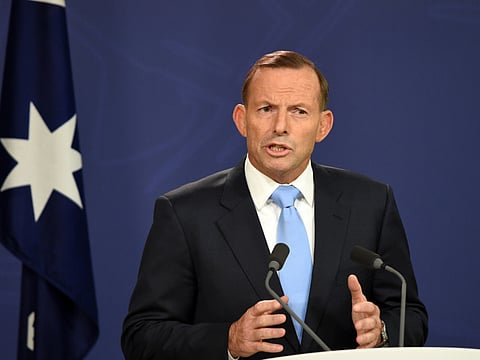Abbott’s final strike against the Indigenous
Australia’s putative ‘prime minister for Aboriginal affairs’ has made many mistakes, showing that he does not respect Indigenous culture

Tony Abbott can declare himself the “prime minister for Aboriginal affairs” all he likes, but his absurd, provocative and naive claim that Indigenous Australians living in remote communities were exercising a “lifestyle choice” is the third rhetorical strike against his credibility on the issue.
Strike one: his assertion Australia was unoccupied or barely occupied at white invasion (tell that to the multiple tens of thousands of Indigenous people who died on the colonial frontier). Strike two: his nomination of the arrival of the first fleet as the seminal moment in continental history. And the third strike: his gauche statement about lifestyle choices. Was it said deliberately, cynically, just to bolster his base? Was it the equivalent of political Dunkin’ Donuts, frisbeed to the reactionaries in his party, in the papers and on the airwaves, who’ve been a bit antsy about all his talk of sweating blood to achieve Indigenous recognition in the constitution?
Or does it have its genesis in the type of ignorance that has led to the profound misunderstanding of — and violence against — this continent’s first people since Captain James Cook landed in Botany Bay in 1770, shot a couple of them on first contact and set about stealing their country? Who can really say? For who among Liberals truly understands what this putative prime minister for Aboriginal affairs actually feels in his heart about anything at all, so distracted is he with the week-to-week gap in the opinion polls? Never mind the other gaps between Indigenous and non-black Australia on the social indicators — mortality, joblessness, imprisonment, school retention rates — that he wanted to dedicate his leadership to closing. But it’s three strikes, and you’re out.
Abbott will never be the prime minister for Aboriginal affairs because his “lifestyle” claim exposed such a fundamental lack of understanding about the imperative of “country” to Aboriginal and Torres Strait Islander people, including those in the cities, that I’m sure few will ever be able to trust him again. Certainly two of his main Indigenous advisers, Noel Pearson and Warren Mundine, seemed incredulous at Abbott’s pronouncement. A “deranged debate”, Pearson called it. He was never one for rhetorical modesty himself. Pearson also, constructively, pointed out that successive governments have failed to address policy issues relating to the remote settlements. Abbott has been given the benefit of the doubt after hefty cuts to Indigenous spending in the last budget, on the symbolic versus practical importance of Recognise, on welfare paternalism.
It will be far easier for the generous to make up their minds today, even after his recent trip to Arnhem land (regarded by too many in Yolngu country as little but a political PR exercise) and his previous work in remote communities. Those who are already notionally opposed to Abbott, Pearson and Mundine on these issues, and many more besides, will be permanently irreconcilable on any initiative, symbolic or practical, that Abbott now proposes in the Indigenous space. They — as well as non-Indigenous Australians who’ve bothered to make any effort to find out — understand how intrinsic is the country, where the remote communities exist, to Aboriginal and Torres Strait Islander people.
Emotional and physical connection to country is the cornerstone of Indigenous existence. It underpins Indigenous spirituality in a way that those who take a purely Judeo-Christian view of the world can, perhaps, never fully understand. The creationist, totemic animals — the crocodile, the turtle, the shark, the rainbow serpent and many others — made the land and the sea and the people and all of the creatures. The songlines chart that belief history, from the beginning of the country until now. Country holds the story of everything in complex, multi-tiered systems of faith (they vary from country to country) that can also incorporate elements of Christianity and Islam into traditional faiths.
Those who want to genuinely try to understand Indigenous Australia need to not only appreciate that. They need to respect it. Living in a remote community that has been connected to your ancestors for upwards of 50,000 years is not a lifestyle choice like visiting the coast for a few weeks over summer or skiing Thredbo in winter. It is a fundamental of being. Abbott’s “lifestyle” comments are freighted with condescension — redolent even of the paternal save-them-from-themselves attitudes of the old colonial protectors and many missionaries. Meanwhile, the outrage today among those Aboriginal people closest to Abbott — Pearson and Mundine — is instructive.
Many Australians concerned with Indigenous betterment long ago determined that this duo made a strategic misjudgment in aligning themselves so closely with Abbott. Today they spoke out. But to what real end? Has Abbott changed his mind, clarified or backed down? No, Abbott’s “lifestyle” pronouncement begs the very important question: where is the genuine evidence of their positive influence on the man who will never be prime minister for Aboriginal affairs”?
— Guardian News & Media Ltd
Sign up for the Daily Briefing
Get the latest news and updates straight to your inbox



